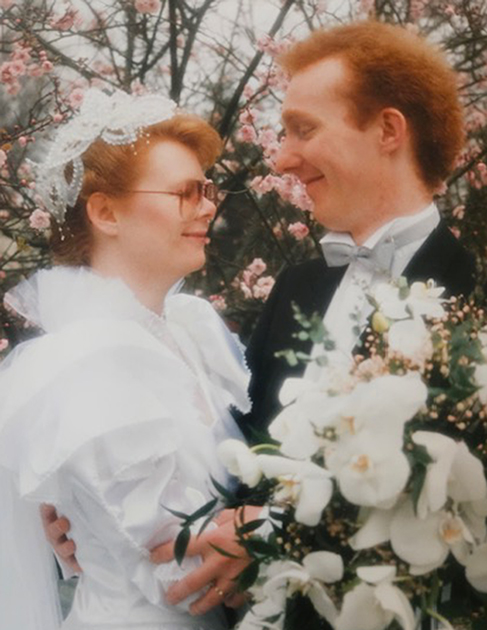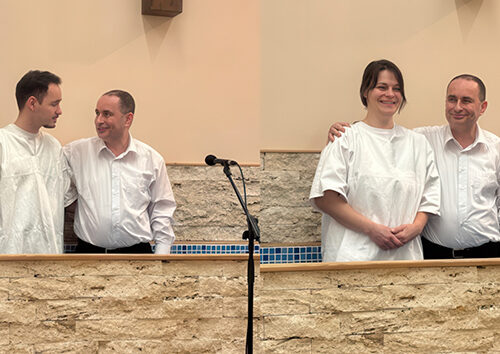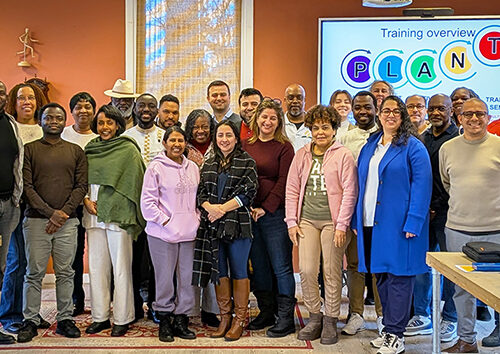12 July 2023 | St. Albans, UK [David Neal]
I first met Marci in London at youth group in the mid-1980’s. As the best man at our wedding said in his speech, “Dave met Marci and pastoral visit – became pastoral care.” We’ve been married for the past 35 years.
We grew up in Adventist homes on the other side of the world from each other, both experiencing home and church life with a strong behavioural code. In addition, our background taught us to be ‘extremely cautious’ about emotions and feelings.

By the time we met, we were both in search of a grace awakening, which has had more impact on the way we relate to each other than we perhaps realised. That’s how we went into marriage – with ‘grace’ on the radar, a partnership of equals from the outset, and including the direction of travel.
Direction of travel? You must be kidding! Looking back, we didn’t have the faintest idea as to how things would turn out. We had hopes and dreams, some of which have been realised, but with many far off the mark.
And it’s been the same for most of our friends from the 1980’s youth group who married within a couple of years before or after us. They too entered marriage full of aspiration and hope about the future. After all, who enters marriage with ‘keep a look out for trouble ahead’ written into the confetti?
Looking back, there was to be incredible trouble ahead for us all without exception – what a friend describes as ‘unwelcome interruptions’. Collectively we experienced life-threatening illness, life-changing illness, life-debilitating illness, of either a physical or emotional nature. And a significant number of children are either physically challenged, emotionally challenged – or both.
In our own marriage there have been at times tremendous pressure points; work-life balance, parenting, managing debt, the ‘unwelcome long-term interruption’ and work-related ‘pit in the stomach’ experiences which stayed around for much longer than either of us would have liked.
“Welcome to my world”, I hear you say. Isn’t this real life? Yes, it is. So does marriage, and more to the point, does Christian marriage help?
Expectation
It does because of expectation. Did we go into marriage all starry eyed and with our heads in a cloud? I don’t think we did even though we entered marriage with the expectation and intention, for it to be life-long, permanent, and exclusive. As we vowed to support each other whatever the circumstance, invited to journey with us was the Holy Spirit and all He offers.
For our marriage then, to be so-called ‘Spirit-filled’ there was no alternative but to learn ‘the unforced rythmn’s of grace’ as Eugene Peterson describes so well. This meant developing a skill set to include sharing, learning, listening, celebrating, forgiving, and caring for each other – physically, emotionally and spiritually. None of these skills were ready-steady-go on day one of our marriage, nor are they fully mature today. We also quickly realised the core value of learning to live self-less lives, putting the other first, rather than living the ‘it’s all about me’ experience. Or to put it another way, self-denial over self-fulfilment.
And when it comes down to it, that’s the real tough one. For all the familiar, beautiful and inspired words of Paul’s 1 Corinthians 13 symphony of praise to love, living this value is a lifetime of work:
“Love is patient, love is kind. It does not envy, it does not boast, it is not proud. It is not rude, it is not self-seeking, it is not easily angered, it keeps no record of wrongs. Love does not delight in evil but rejoices with the truth. It always protects, always trusts, always hopes, always perseveres. Love never fails… (1 Corinthians 13:4-8 NIV).
Endurance
Paul says “Love… is not proud.” He may state the obvious, but surely worth highlighting in the context of ensuring a happy and lasting marriage. Because the very opposite of pride is humility. How can a marriage survive without each spouse having a teachable spirit? Is this not where the example of the marriage relationship is like our relationship with God? (Ephesians 5)
Joy
“Having a soulmate”, said Marci, “is what brings me joy in our marriage, through enjoying shared experiences together. Add to that is the joy our children and grandchildren bring.”
Some see the idea of a ‘soulmate’ as the quest for the ‘only one’, Greek mythological perfect partner of destinty to experience total happiness with. Far from it – neither of us are perfect, and nor do we experience uniformity of thought. But the soulmate joy for us is about living in a high trust, emotionally safe and secure place where we can truly be ourselves, loved and accepted unconditionally.
The late preacher and author Tim Keller once said, “The reason that marriage is so painful and yet wonderful is because it is a reflection of the Gospel, which is painful and wonderful at once.” Keller goes on to explain how he understands the Gospel.
“We are more sinful and flawed in ourselves than we ever dared to believe. And at the very same time we are more loved and accepted in Jesus Christ more than we ever dared hope. This is the only kind of relationship that will ever transform us.”¹
I read this to understand that marriage can only endure and be joy-filled with God’s mercy and transforming grace. That’s the theology – and would like to think our story in some way connects with His story.
¹Timothy Keller and Kathy Keller (2013), The Meaning of Marriage: Facing the Complexities of Commitment with the Wisdom of God, Penguin Books.
[Photos: featured image, by Sandro Crepulja Pexel. Neal wedding photo, Robert Wheeler]



